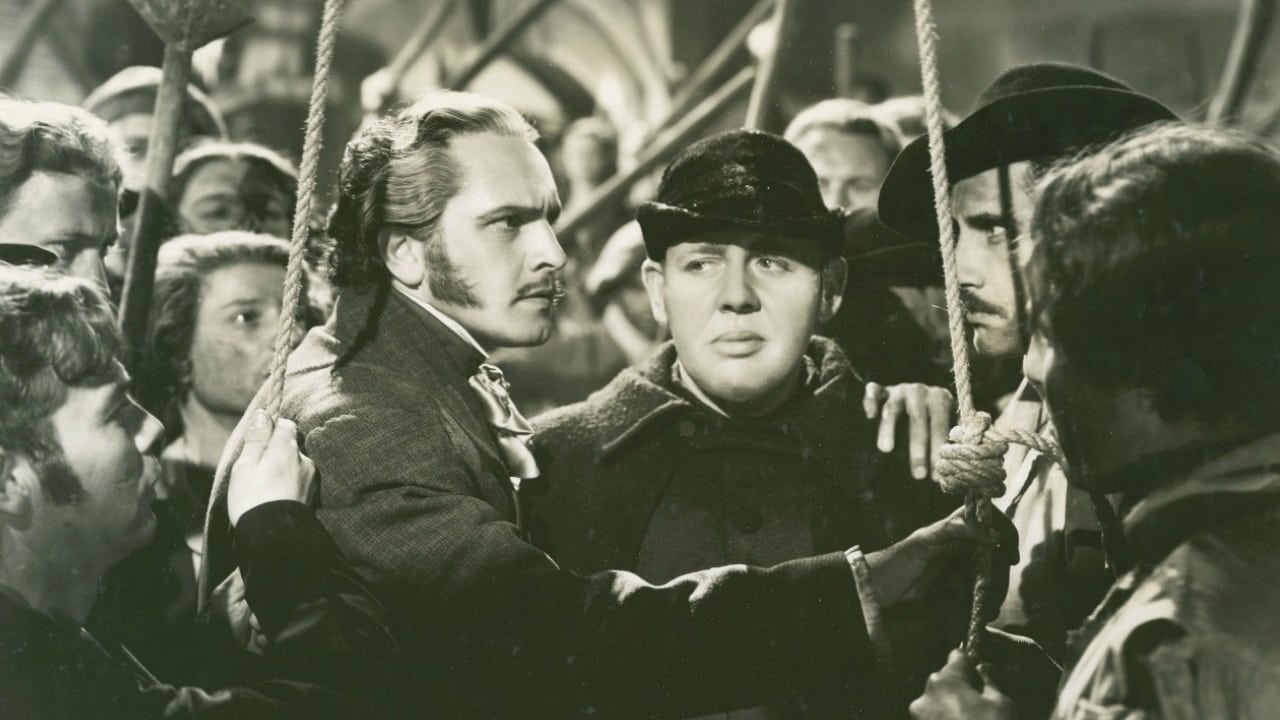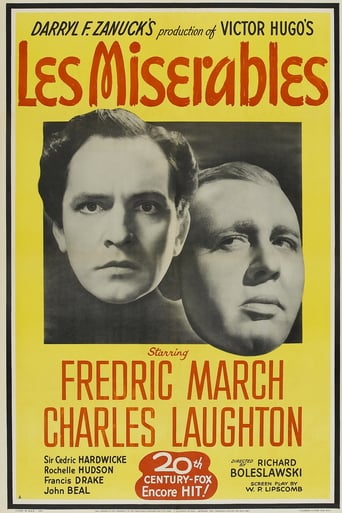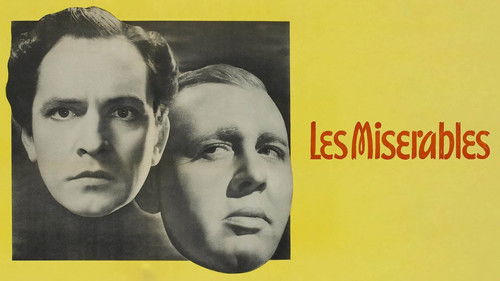


good back-story, and good acting
... View MoreThe tone of this movie is interesting -- the stakes are both dramatic and high, but it's balanced with a lot of fun, tongue and cheek dialogue.
... View MoreIt's a good bad... and worth a popcorn matinée. While it's easy to lament what could have been...
... View MoreIt is interesting even when nothing much happens, which is for most of its 3-hour running time. Read full review
... View MoreI'll always have a soft spot in my heart for Fredric March, since he reminds me of my grandpa in The Best Years of Our Lives. Sometimes, as in that movie, he's a wonderful actor; but sometimes, he's just stinky. In Les Misérables, he plays the famous literary hero Jean Valjean, and unfortunately, he's pretty stinky. Charles Laughton plays the complex villain Inspector Javert. As everyone knows, since the story is French, his character name is pronounced "Jah-verr". Fredric March doesn't say it that way. From start to finish, he calls his enemy "Ja-vert". My dad came up with a possible reason for the outrageously embarrassing mistake: Freddie said "Ja-vert,", and director Richard Boleslawski said, "Cut! Freddie, it's 'Jah-verr.'" Freddie said, "Yeah, yeah, I know." Then, thrown out into the ring again, he said "Ja-vert." Rinse and repeat. That scenario sounded so much like something my grandpa would do, that even though "Ja-vert" almost ruins the movie, it still makes me laugh.Now, let's talk about what else is wrong with this version. I really like Charles Laughton, but I think he was miscast as Javert. Charles has a very expressive face, and he always comes across as having enormously deep problems. Javert can't look that way. He's strict, rigid, and has enormous discipline because he loves the law. He doesn't have deep emotional problems. The supporting cast isn't that bad, with Rochelle Hudson as Cosette, Florence Eldridge as Fantine John Beal as Marius, and Cedric Hardwicke as the bishop. Rochelle and Fredric March are pretty contemporary, and parts of the story feel rushed and cheaply done. All in all, this really isn't the best film adaptation of Victor Hugo's novel. Every version has its ups and downs, though, so it's a matter of taste when you pick your favorite.
... View MoreI thought I had seen them all, but then as a surprise this one appeared with the blatant curiosity of Charles Laughton as Javert. Of course you couldn't miss such an opportunity, no matter what it purported. Of course, it was worth seeing especially for Charles Laughton, who is an unusually nasty police here, a police of the very worst sort, all formality and no humanity, but he makes it amazingly convincing - there actually are such policemen. Frederic March is not bad as Jean Valjean, and for once, perhaps the only time in the cinema, you are able to see Jean Valjean as a young and handsome man - even his sister is with him in the introduction scene.Cedric Hardwicke as the bishop, perhaps the most important character in the whole novel, doesn't have to make any effort into his part, it is all written and can't be made any worse by anyone, and he actually adds some humor to it, lacking in Victor Hugo. The question has been raised what Victor Hugo would have thought. This film was made only a year after the great French masterpiece of five hours by Raymond Bernard, the best and truest film on "Les Miserables", although even that fools around with Hugo a bit, but this American version is unfortunately the worst. The character of Jean Valjean is missing, as Frederic March thoroughly overdoes it, while the very strength in the character lies in his absolute self control, which is spoilt here, compensated somewhat by Laughton's all too true performance. Worst is the child Cosette, who preludes Shirley Temple. John Beal as Marius is a positive surprise, while the important part of Gavroche is missing altogether. Still it's an exciting film, it must be the most abbreviated version of "Les Miserables" ever made, and you pardon its gross coarseness and vulgarization of the novel since it's still after all the same novel, perhaps the greatest ever written. Victor Hugo would not have liked this film version much, especially not after the great French version the year before, but he would have tolerated it.
... View MoreA fine Melodramatic Film full of typical mid 30's lavish Production Values with two theatrical Lead Performances, fine Cinematography, and an always welcome reflection of injustice and despicable Human Behavior. It is a timeless tale and an unsettling reminder of an ever present, oppressive World full of Egotists and power hungry States and those who perpetuate Evil with hardly a notice.This is a much admired Movie of an often filmed story of an insightful Novel from a beloved and wordy Author. This one tallied about 1100 pages. This Cinema version is just under two hours. It is punctuated with some heavy handed Religious Artistry such as light beams, Angelic Choirs, and back-lit Characters with Halos and soft focus. There are some stunning and heartfelt Scenes and a dash of Revolutionary Rhetoric with street scenes that could remind current Viewers of the Sixties and the SDS.Film Critics and Historians usually list this one the best of the many Screen incarnations, but a few differ. Truth be told, this is probably the most easily accessible because of its shorter length and its Hollywood Golden Age allure. The book is probably read by about 1% of the population at any given time and with each passing Year even that small number is dwindling. This Movie most likely is suffering the same fate.
... View MoreHAVING RECENTLY VIEWED this 1935 version of this epic reminded this graybeard of having seen it on local television, many moons ago. On that occasion, which was circa 1958, this writer was about 10 or 11. But even at that tender age, the power of the story,as well the great magnitude of the production, were clearly evident.OF COURSE TODAY, much more of the story was much more clearly understood; which is, of course, what one would and should be the norm.WITH SUCH AN outstanding and voluminous a cast, we are blessed with an epic that truly matches the visual imagery with the outstandingly brutal and highly depressing storyline. This ensemble is outstandingly handled by the Director and has the advantage of the talents of Mr. Frederic March and Mr. Charles Laughton (in his pre-Captain Bligh and pre-Quasimodo days).THE GREAT MAGNITUDE and stoicism of the film are two ingredients that would seem to qualify it as a true epic film; a singular work of art that is almost as big as it would be in real life. It certainly would not be a more worthy candidate for such celluloid canonization if the great D.W.Griffith had been the Director.THE FILM IS an early production for Daryl F. Zanuck's fledgling 20th CENTURY Pictures; which would soon be merged with FOX Studios as a true giant of the Hollywood scene.Mr. Zanuck did hid releasing through UNITED ARTISTS, then. Later, 20th CENTURY-FOX proudly boasted that they produced and distributed their film output.IN ADDITION TO all of the above mentioned talent that the production boasted, there is one who cannot be overlooked. And that would be Cinematographer, Greg Toland. He is the guy who would go on to do so much innovation while at RKO RADIO Pictures. He would also collaborate with Orson Welles on CITIZEN KANE and with Walt Disney on SONG OF THE SOUTH and others.AN INTERESTING SIDE BAR to the story occurs most naturally in the subsequent years. Inasmuch that this was an early Daryl F. Zanuck production, it follows quite logically that It would be he who would be the one to recreate the Allied Invasion of Nazi occupied Europe in 1944, with THE LONGEST DAY, some 27 years later.GADZOOKS! IT DOTH appear that the Epic had become the Blockbuster!!
... View More